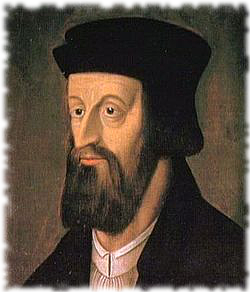John Huss
John Huss
 John Huss lived from 1369-1415. He was a Bohemian reformer. Huss was ordained to the priesthood of the Roman Catholic Church in 1401, after receiving the bachelor’s and master’s degrees at the University of Prague. He became a powerful preacher of Roman doctrine, until he began to translate some of the sermons of John Wycliffe into the Bohemian language. These sermons moved him to cry out for reform in the Church, and a return to the authority of the Scriptures as the sole source of faith and doctrine for the Christian. He at once was branded a heretic, excommunicated, and his writings were suppressed. He found refuge outside of Prague, where he continued to preach, write, and study. The chief product of his pen concerning the Church developed the Wycliffe teachings concerning the universal priesthood of all believers, stating in no uncertain terms that Christ is the only Head of the church. In 1414 he was promised safe conduct by the Pope and the Emperor Sigismund to the Council of Constance to present his views. Instead of hearing him, the Council had him arrested, gave him a mock trial without the benefit of an advocate, and condemned him to death as a heretic. He was kept in prison for seven months before he was brought forth to be burned. As Huss stood before the stake he said, “In the truth of the Gospel which I have written, taught, and preached, I die willingly and joyfully today.” Then the fire was kindled, and as the red tongues of flame driven by the wind from the Lake of Boden rose high around the body of the martyr, Huss sang, “Jesus Christ, the Son of the Living God, have mercy on me.” The Pope dismissed his own broken promise of safe conduct to Huss with, “When dealing with heretics, one is not obligated to keep his word.”
John Huss lived from 1369-1415. He was a Bohemian reformer. Huss was ordained to the priesthood of the Roman Catholic Church in 1401, after receiving the bachelor’s and master’s degrees at the University of Prague. He became a powerful preacher of Roman doctrine, until he began to translate some of the sermons of John Wycliffe into the Bohemian language. These sermons moved him to cry out for reform in the Church, and a return to the authority of the Scriptures as the sole source of faith and doctrine for the Christian. He at once was branded a heretic, excommunicated, and his writings were suppressed. He found refuge outside of Prague, where he continued to preach, write, and study. The chief product of his pen concerning the Church developed the Wycliffe teachings concerning the universal priesthood of all believers, stating in no uncertain terms that Christ is the only Head of the church. In 1414 he was promised safe conduct by the Pope and the Emperor Sigismund to the Council of Constance to present his views. Instead of hearing him, the Council had him arrested, gave him a mock trial without the benefit of an advocate, and condemned him to death as a heretic. He was kept in prison for seven months before he was brought forth to be burned. As Huss stood before the stake he said, “In the truth of the Gospel which I have written, taught, and preached, I die willingly and joyfully today.” Then the fire was kindled, and as the red tongues of flame driven by the wind from the Lake of Boden rose high around the body of the martyr, Huss sang, “Jesus Christ, the Son of the Living God, have mercy on me.” The Pope dismissed his own broken promise of safe conduct to Huss with, “When dealing with heretics, one is not obligated to keep his word.”
SEE ALSO: Jan Hus, wikipedia.org




















Leave a Reply
You must be logged in to post a comment.